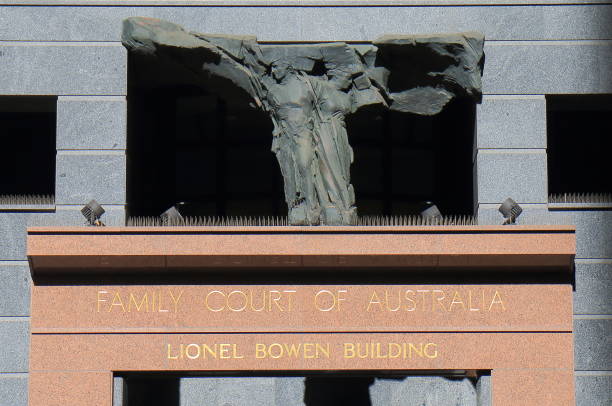According to Section 39 of the Family Law Act 1975, the Federal Circuit and Family Court of Australia (FCFCOA) has family court jurisdiction over matrimonial causes. Matrimonial causes are court proceedings that involve divorce or separation of two couples. Any Supreme Court of a state or territory handles these proceedings. Here are the eligibility requirements for divorce proceedings:
- Australian citizens
- Domiciled people in Australia
- Ordinarily residents in Australia or have been Australian residents for at least 1 year
The legal right for a court to hear a family law case is called family court jurisdiction. If the court lacks jurisdiction, they are unable to hear a case, and the concerned individual will need to take it to the proper tribunal. Read on to know more about family court jurisdiction in family law proceedings.
Section 39A and 39B: De Facto Financial Causes
A de facto financial cause is a proceeding where a de facto partner should provide maintenance for their partner after the breakdown of their relationship. But what requirements should de facto partners have for courts to hear their financial cause? Both or at least one of the de facto partners must also be an Australian Citizen, ordinarily resident in Australia, or:
- Present in Australia the following day the application is filed
- Present in Australia on the day the application to start the proceedings is made
The jurisdiction in de facto financial causes is heard at the FCFCOA, the Supreme Court and each court of summary jurisdiction of each Australian Territory. This is mentioned in Section 39B of the Family Law Act.
A couple is in a de facto relationship if they are living on a genuine domestic basis and are not legally married. A couple also qualifies as de facto couples if they have been together for at least two years.
Family Court Jurisdiction: More Information About De Facto Relationships
How can someone tell if their relationship is on a “genuine domestic” basis? The simplest approach is to consider whether a person is cohabitating with another person as though they were married. When determining if a de facto relationship exists, some factors to consider are:
- Financial aspects of the relationship like sharing the cost of utilities and bills
- Providing financial support to the other
- Nature of the household like sharing household chores
- Shared social circles and participating in social activities together
- Level of commitment to a shared life
A de facto relationship can exist even if one of the parties is officially married to someone else or in another de facto relationship. Moreover, it can occur between people of the same sex. When a de facto couple’s relationship ends, entitlements and rights take on greater significance.
Additionally, de facto couples have the same rights as married couples. If both de facto couples can come to an agreement on a fair asset division, they can separate and divide their assets without going to court. However, disputing couples must go to court in the event of a disagreement.

Section 39C and 39D: Powers of the Governor-General of Australia
The Governor-General of Australia may cease the family court jurisdiction of the Supreme Court of the Northern Territory of Australia on de facto financial causes. In accordance with any proclamation, the Supreme Court of NT may not hear or determine de facto financial causes.
According to Section 39D, the Governor-General may also cease jurisdiction of state or territory courts of summary jurisdiction on de facto financial causes. The representative of His Majesty The King in Australia is the Governor-General. In reality, they perform a number of constitutional and ceremonial obligations as Australia’s Head of State.
Section 39E: Revoking Proclamations
The Governor-General may also revoke a proclamation under Sections 39C and 39D on and from a specified day.
Section 39F: Jurisdiction of a Territory Court
A territory court must not hear or decide during a de facto financial cause. This is the case if at least one of the parties involved in the de facto financial cause does not reside in the territory. A territory court may not also have family court jurisdiction on a de facto financial cause when the proceedings are instituted or transferred to the court.
Section 39G: Transferred Matter Under Commonwealth Laws
According to Section 39G, there are proceedings that arise under a law of the Commonwealth that are transferred under the Family Law Act or the FCFCOA Act 2021 to a court that has jurisdiction as stated in this Division (Division 2 of Part V) of the FLA. If such proceedings exist, the court now has jurisdiction in relation to that matter.
Family Court Jurisdiction Over Family Law Matters
Divorce
The FCFCOA can aid ex-spouses who are applying for divorce. Divorce is the legal termination of a marriage, however both spouses must prove a 12-month separation before applying for a divorce. It will cost couples $990 (in 2022) to apply for a divorce according to the family court’s family law fees.
Spousal Maintenance
Following a divorce, higher earning spouses have the duty to provide monetary assistance (spousal maintenance) to their lower-earning partner. However, lower-earning partners must first prove to the court that they are eligible for receiving spousal maintenance. Courts have the family court jurisdiction in deciding who to grant spousal maintenance to.
Parenting Orders and Enforcement of Orders
Parenting orders contain parenting arrangements that both parents must follow. Courts can make parenting orders in two ways. Firstly, courts may make parenting orders if both parties agree to a parenting arrangement. While the second way is making parenting orders after a hearing or a trial.
Location and Recovery Orders
Courts also have family court jurisdiction for location and recovery orders for a child. They may request for these orders if a parent unlawfully relocated or abducted a child without the knowledge of the other parent.
Warrants of Apprehension
A court may issue this warrant if a defendant fails to agree to a summons or a bail agreement. According to the Criminal Procedure Act of 1921, a court may issue a warrant for the arrest of a defendant.
Detention of a Child
When it comes to the detention of minors, both national and international human rights law are crystal clear. It is mentioned in section 4AA of the Migration Act 1958 that courts may detain a minor only as a measure of last resort. However, as Humanrights.gov.au argues, the Australian government detains non-citizen children in Australia – going against what the principle actually states.
The law mandates the imprisonment of all non-citizen children in Australia without a valid visa. Their detention continues until they are granted a visa or until they depart the country. This remains a contentious topic, with many arguing that the government’s policies breach the universal principles on the rights of children.
Determination of Parentage
Parents must prove to the Registrar that they are the parents of a child when requesting a child support assessment. There are times where a person is unsure of who the father of a child is. Hence, this makes it hard for courts to have family court jurisdiction on who is liable for paying child support. Moreover, this may also affect a person’s ability to apply for Centrelink benefits and other services.

Seeking Legal Advice From Family Lawyers
It is highly advised that people who are involved in family law proceedings seek legal advice from family lawyers. Why? Because family lawyers have the right experience and knowledge to help resolve their client’s legal matters. JB Solicitors’ family lawyers have decades of experience in representing clients in court and conducting mediation and arbitration.
These methods can help clients get the best resolution for parenting matters and financial matters. Our solicitors also have the knowledge of family court jurisdiction and how family law can affect their rights and obligations as parents. We offer fixed fees for all of our family law services.
Contact a family lawyer today.
